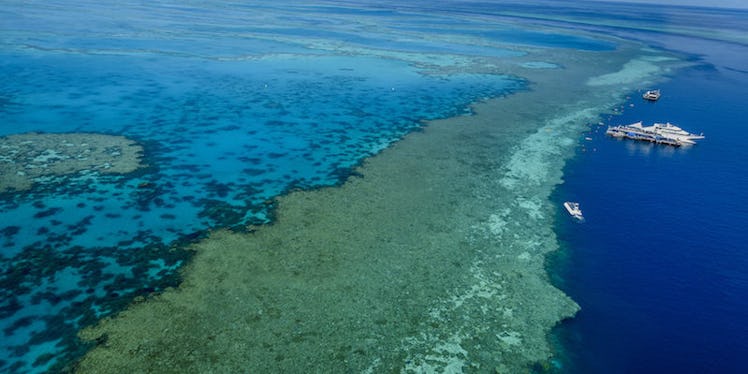
Climate Change Could Actually Be Destroying The Great Barrier Reef
Scientific surveys of the Great Barrier Reef revealed nearly all of the world's largest coral ecosystem is in danger of dying.
Australia's National Coral Bleaching Task Force studied 911 individual reefs within the 1,429-mile Great Barrier Reef, which is located off the country's northeastern coast.
The team, led by Professor Terry Hughes of James Cook University, found 93 percent of the reefs experienced different levels of bleaching, according to The Washington Post.
Bleaching occurs when coral is drained of symbiotic algae that gives coral its color and provides vital nutrients. This is caused by unusually high water temperatures or extreme meteorological events.
Prolonged bleaching can result in coral death, depending on the amount of damage sustained.
The worst bleaching was observed in the reef's northern sector, where 81 percent of the individual reefs were deemed "severely bleached,” CNN reports.
In a statement, Professor Hughes said,
Between 60 and 100 percent of corals are severely bleached on 316 reefs, nearly all in the northern half of the Reef.
Andrew Baird of the ARC Centre of Excellence for Coral Reef Studies told CNN “an average of close to 50 percent mortality of bleached corals” has been measured at the northern sector.
He added,
At some reefs, the final death toll is likely to exceed 90 percent. When bleaching is this severe, it affects almost all coral species, including old, slow-growing corals that once lost will take decades or longer to return.
Professor Hughes was not shy in expressing his reaction to the observations.
Just 1 percent of the southern sector was categorized as “severely bleached,” but only a quarter was categorized as unbleached.
Tourists, however, apparently only visit the northern sector, generating $5 billion a year. Should tourism cease for the Great Barrier Reef, approximately 70,000 jobs would be lost.
Scientists have attributed the bleaching to El Niño, or warmer ocean temperatures in the Pacific, and climate change. Professor Hughes said the overall change in ocean temperatures is comparable to “10 cyclones” occurring at the same time.
Previous research has shown if climate change continues on the same trend, coral will be less able to survive bleaching.
Citations: 'And then we wept': Scientists say 93 percent of the Great Barrier Reef now bleached (The Washington Post)